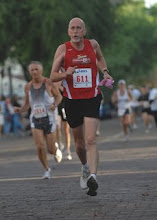You go on a road trip to a race with a group of friends from your running club. You share a hotel room to keep the costs down. You think you know your roommate well, after all you're sharing the room. At 2:00am your roommate gets up to use the bathroom. You hear something, but you're not really sure what it was. Looking at your friends bed you realize it's empty. A quick glance around the room and you see their motionless body on the floor, blood coming from their ear.
First, you are going to call "911" from your cell phone. Do not call the front desk and ask them what to do. (unless you cannot contact 911 from your phone). Call the front desk after you notify emergency services. This will help in directing the EMT's to the room. Do not move the person. Help arrives to take care of your injured friend, but they are still unconcious or incoherent. Do you know who to contact if a friend is injured? Remember they can't tell you who to call.
There is a program that gained much publicity several years ago, it is called "ICE". It stands for "In Case of Emergency". Everyone who owns a cell phone should have at least two phone numbers listed as "ICE". Simple to do, add "ICE" as you would enter any name, then the persons home, work and/or cell phone numbers. Emergency Responders are, or should be, trained to look for this on a victim's cell phone.
This scenario, with a few changes, actually took place recently. Thankfully the "victim" was staying with her husband and the notification was not necessary. We lucked out!
Do you have "ICE" entered on your cell phone. If not take a moment to add the numbers.
Subscribe to:
Post Comments (Atom)











7 comments:
And if we are on the run with no cell phone, wear a ROAD ID or tuck I C E contacts in your shoe!
Who's old enough to remember when your mother would sew a nametag inside your clothes?
Cathy,
I'm going to add a "link" to Road ID. they make great birthday or Christmas presents.
I would use the hotel's phone to dial 911. Your hotel address is more likely to show up on the 911 system than if you dialed from a cellphone. They are morely likely to dispatch help to the correct location, especially if you are panicked and talking too fast.
Putting emergency contact info on your driver's license and/or health insurance card would be useful as well. Your cellphone may not be transported with you to the hospital; it could be require a password; or hospital personnel may not know how to use the address book in your cellphone.
Lastly, when you check into a hotel, take a moment to have a exit plan in case of fire. I always keep a flashlight on the nightstand.
All excellent points Hung. There is a lot we can do to be safe. Check the hotel phone to make sure you can direct dial "911", or do you need to dial an extention "9", or something else to get an outside line.
All excellent points. I've now been ICE'd :-)
Well, I think I'm signed in - we'll know in a minute
Post a Comment